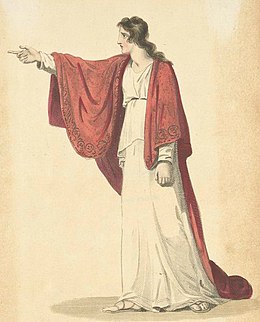Gli Orazi e i Curiazi
| Gli Orazi e i Curiazi | |
|---|---|
| Azione tragica by Domenico Cimarosa | |

Giuseppina Grassini as Orazia
|
|
| Translation | The Horatii and the Curiatii |
| Librettist | Antonio Simeone Sografi |
| Language | Italian |
| Based on |
Horace by Pierre Corneille |
| Premiere | 26 December 1796 Teatro La Fenice, Venice |
Gli Orazi e i Curiazi (The Horatii and the Curiatii) is an opera in three acts (azione tragica) composed by Domenico Cimarosa to a libretto by Antonio Simeone Sografi, based on Pierre Corneille's tragedy Horace.
The opera was first staged on 26 December 1796 at the Teatro La Fenice in Venice. The première was so unsuccessful that Cimarosa, disappointed, decided to leave the town immediately. The run of the following performances, however, turned into a big success, as would happen twenty years later with Rossini’s The Barber of Seville. At least 49 performances were held throughout the season and the opera was later staged in the major European theatres, including Teatro La Scala in Milan and Napoleon’s imperial court in Paris. In Europe during the 18th century Italian operas did not normally endure very long in theatres, hardly ever getting through one season. Gli Orazi e i Curiazi, however, kept running for several decades, even after the death of Cimarosa. In Venice, for example, the opera had four further runs during the six years following the première and "more than 130 performances" altogether were staged in the same period.
The opera had several re-adaptations, among which Marcos António Portugal’s staged in 1798 is specially notable, and was also employed as the object of the parody La prima prova dell'opera "Gli Orazi e i Curiazi" by Francesco Gnecco on Giulio Artusi’s libretto – later to be renamed La prova di un'opera seria – which was also staged in Venice in 1803.
Gli Orazi e i Curiazi was very dear to Napoleon, especially in the Parisian performances of the singer Giuseppina Grassini who was for some time a lover of the Emperor, and of the castrato Girolamo Crescentini — both of whom had been the original creators of the major roles of Horatia and Curiatius in 1796. Grassini would almost always interpolate arias different from the original ones, mostly drawn from Portugal’s version.
...
Wikipedia
